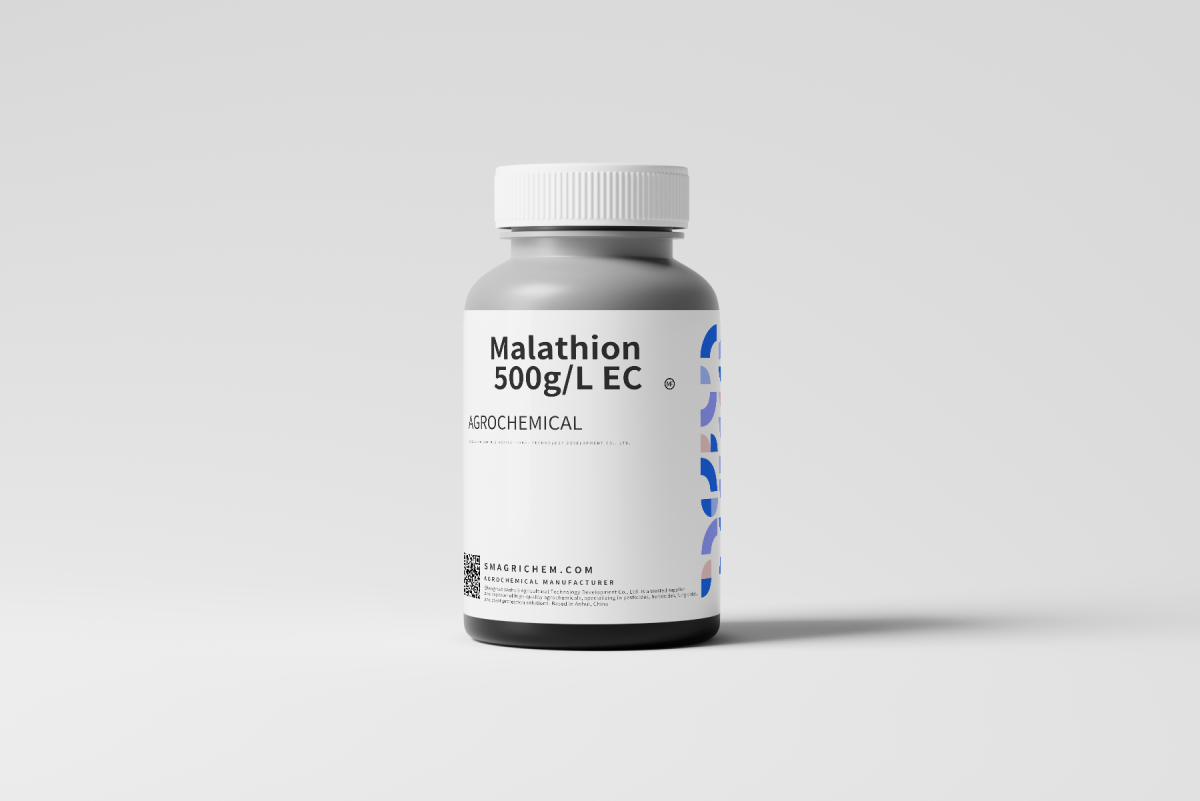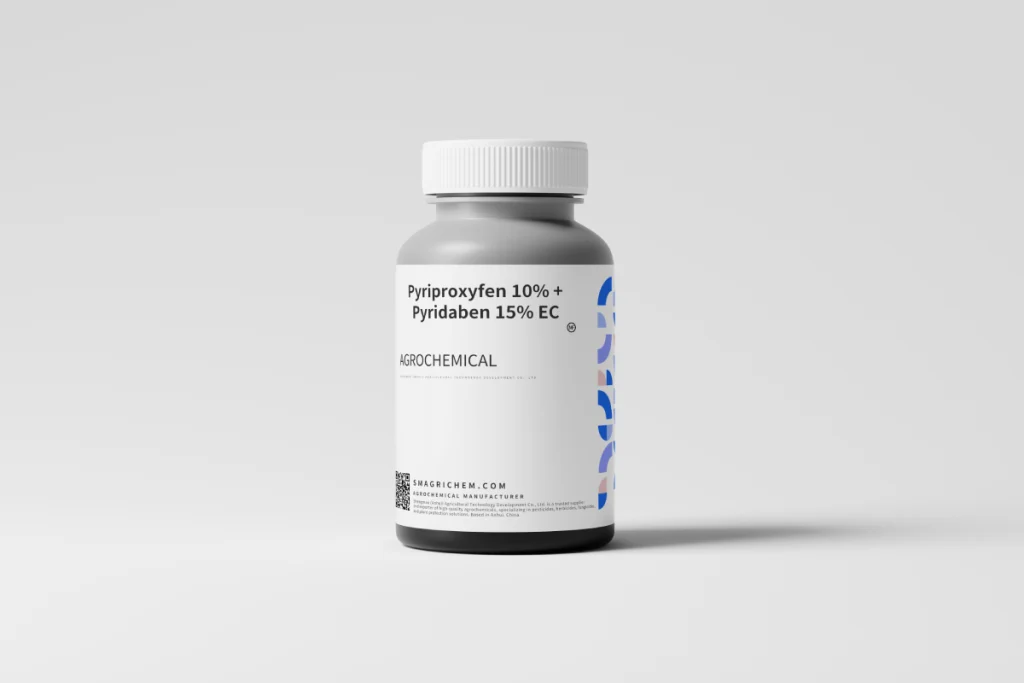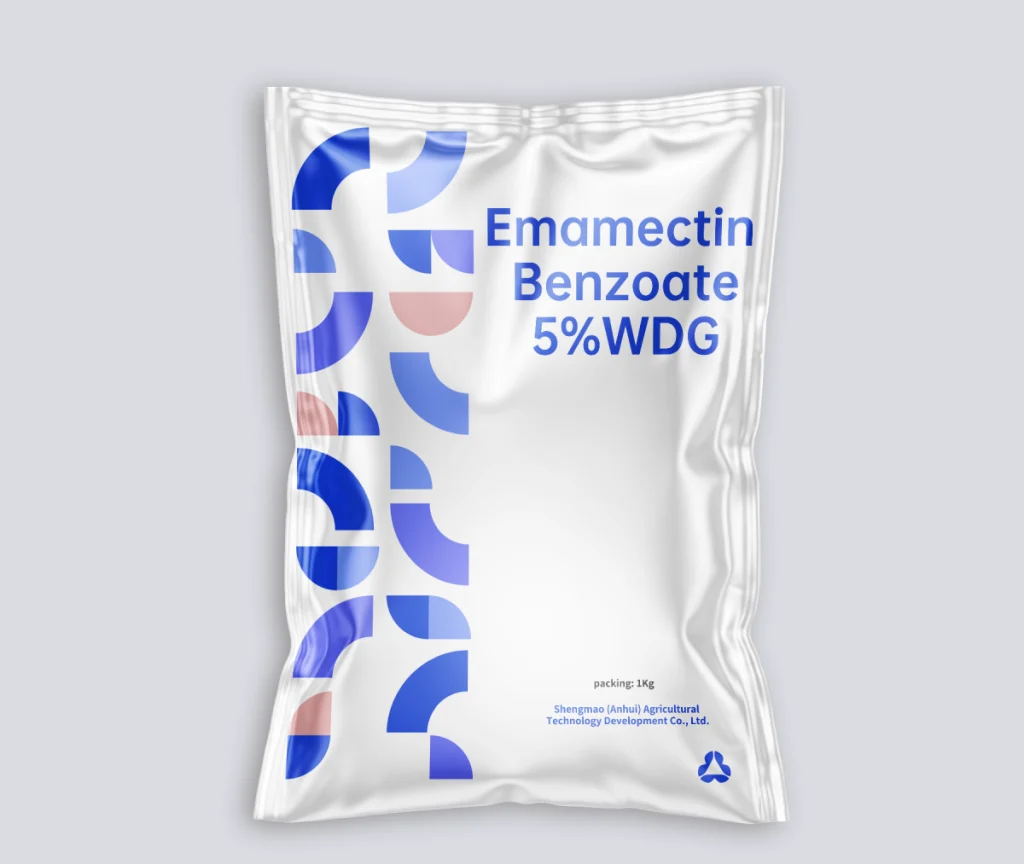Product Overview
| Item |
Details |
| Product Name |
Malathion Insecticide |
| IUPAC Name |
Diethyl 2-[(dimethoxyphosphorothioyl)sulfanyl]butanedioate |
| CAS Number |
121-75-5 |
| Molecular Formula |
C₁₀H₁₉O₆PS₂ |
| Formulation |
Emulsifiable Concentrate (EC) |
| Appearance |
Clear yellow to dark brown liquid |
| Solubility |
Slightly soluble in water; soluble in ethanol, acetone |
| Shelf Life |
2 years (under recommended storage) |
| Storage |
Store in cool, dry, well-ventilated area, away from food and feed |
| Packaging Options |
1L, 5L, 20L, and bulk sizes available |
Mode of Action: How Malathion Works
Malathion is an organophosphate insecticide that targets the nervous systems of insects:
-
Enzyme Inhibition: Malathion inhibits acetylcholinesterase (AChE), an enzyme needed to break down acetylcholine.
-
Neuro Overload: Acetylcholine accumulates, overstimulating nerves.
-
Pest Paralysis: Continuous nerve firing causes paralysis and death.
✅ Results: Fast knockdown and long-lasting protection against target pests.
Applications & Use Cases
1. Agricultural Applications
Protects a wide range of crops:
-
Cereals (rice, wheat, maize): Targets aphids, leafhoppers, armyworms.
-
Fruits (citrus, apples, grapes): Controls scale insects, fruit flies, mealybugs.
-
Vegetables (tomatoes, peppers): Kills caterpillars, whiteflies, thrips.
-
Oilseeds & Pulses: Effective against aphids and pod borers.
Application: Use foliar spraying in early morning or late afternoon for best coverage.
2. Horticultural Use
Protects ornamental plants, flowers, shrubs, and greenhouse crops:
-
Controls aphids, whiteflies, mites, and thrips
-
Preserves flowering and decorative aesthetics
-
Safe for greenhouse and nursery environments
Spray directly on foliage for thorough coverage.
3. Residential Use
Ideal for garden, lawn, and household pest control:
-
Mosquito Control: Use Malathion mosquito spray to reduce disease risk.
-
Garden Protection: Use Malathion 50 EC to treat aphids, beetles, bagworms.
-
Household Insects: Apply for quick knockdown of flies, fleas, ants, and cockroaches.
Suitable for outdoor perimeter sprays, lawns, and decorative gardens.
4. Veterinary Use (Formulation Specific)
Malathion lotion can also be used:
Why Choose Malathion from us?
✔️ Broad-Spectrum Control
-
Kills mosquitoes, grasshoppers, beetles, fleas, spider mites, lice, and more.
✔️ Flexible Formulations
-
Available as Malathion 50 EC, 55 EC, 57 EC, lotion, and powder for varied use cases.
✔️ High Efficacy
✔️ Custom Solutions
✔️ Quality Certifications
Product Specifications
| Active Ingredient |
Malathion (50% – 65% EC and other variants) |
| Formulation Types |
Emulsifiable Concentrate (EC), Liquid, Lotion, Powder |
| Packaging Sizes |
1L, 5L, 20L, bulk drums available |
| Shelf Life |
2 Years |
| Storage |
Keep sealed in a dry, cool, ventilated place |
Precautions & Safety Guidelines
-
Always read label instructions before application
-
Use PPE: gloves, masks, goggles during preparation and spraying
-
Avoid contact with eyes, skin, or inhalation
-
Do not apply near water bodies to prevent environmental impact
-
Perform compatibility tests when mixing with other products
Industries We Serve
Frequently Asked Questions About Malathion and Pest Control
1. Is malathion effective against fleas and ticks?
Yes, malathion can eliminate both adult fleas and ticks when applied to infested areas such as lawns, pet bedding, and outdoor spaces.
2. Can I use malathion to get rid of mosquitoes?
Absolutely. Malathion is widely used in mosquito control programs and is highly effective against adult mosquitoes when sprayed properly.
3. Will malathion kill cockroaches?
Yes, malathion can be lethal to cockroaches. However, for indoor infestations, more targeted roach control products may offer better results.
4. Can malathion eliminate bed bugs?
Malathion has some effectiveness against bed bugs, but due to resistance and safety concerns indoors, it’s not typically the first-choice treatment.
5. Does malathion work on ants and fire ants?
Malathion can control many types of ants, including fire ants. However, bait-based solutions are often more effective for long-term ant control.
6. Is malathion useful for controlling flies?
Yes, malathion is effective against common fly species and is often used in agricultural and outdoor settings for fly management.
7. Can malathion help get rid of Japanese beetles?
Yes, Japanese beetles and other beetle species can be controlled with malathion when applied according to label directions.
8. Does malathion kill termites?
No, malathion is not recommended for termite control. Specialized termiticides are more effective for that purpose.
9. Is malathion a good solution for whiteflies?
Yes, malathion is frequently used in gardens and greenhouses to manage whitefly populations on plants.
10. Can malathion be used to control aphids, mites, and thrips?
Yes, malathion is effective against a range of soft-bodied pests such as aphids, thrips, certain mites, and scale insects.
11. Can I use malathion to kill spiders?
While malathion may kill spiders on direct contact, it’s generally not very effective since spiders are not insects and often avoid treated surfaces.
12. Does malathion kill crickets?
Yes, crickets can be controlled with malathion applications in outdoor environments or around the foundation of buildings.
13. Can malathion treat mealybugs and bagworms?
Yes, malathion is effective against both bagworms and mealybugs, especially when used during the insects’ active feeding stages.




